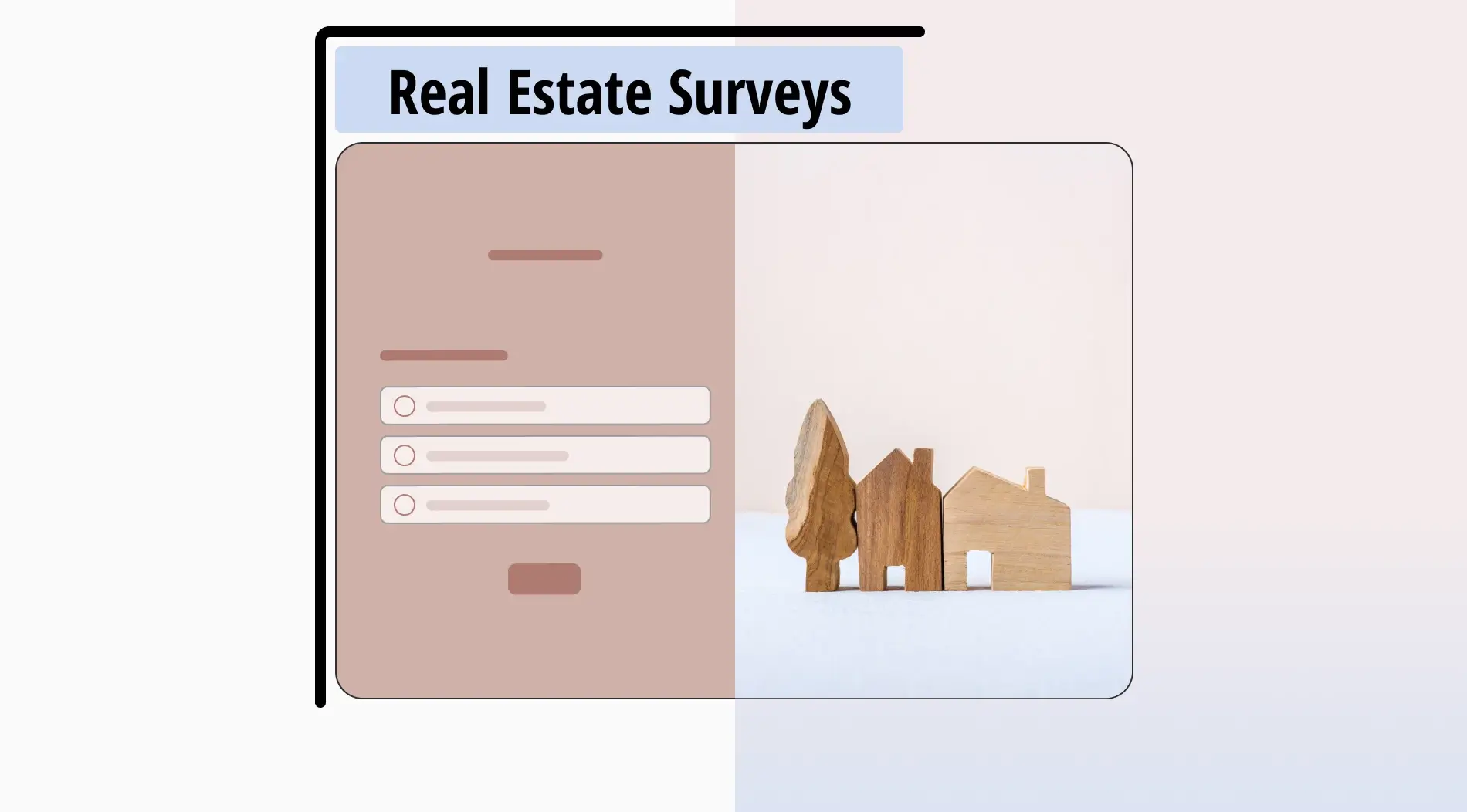Do you want to be successful in your real estate business? Understanding your customers' needs and wants is the best way to do this. What do your customers expect from you as a property owner? Real estate surveys can help you learn all this. Create a real estate survey and develop an effective strategy by adapting your services to your customer's expectations.
In this article, you can find everything you are looking for about real estate surveys. First of all, we will talk about what real estate surveys are. We have prepared 15+ questions that you should be asked in real estate surveys and focused on what benefits asking these questions will provide you. You can also learn how to create a real estate survey without coding and 7 expert tips.
What is a real estate survey?
Real estate surveys are valuable research tools that allow organizations in the real estate sector to obtain information about the preferences, expectations, and financial capabilities of their customers or potential buyers.
Using these surveys, you can understand your customers' needs more profoundly and narrow your services to the target. It also provides time and resource efficiency.
A well-conducted property survey is also essential for identifying property lines and providing legal descriptions. In addition, property research involves making use of land surveyed and property records. Using historical records like boundary surveys and construction surveys, you can access data such as property characteristics, boundary lines, type of land, parcel of land, or piece of land.
15+ must-ask questions to ask in your real estate surveys
You can learn their opinions and expectations directly from your customers through real estate surveys. Below, we have presented real estate survey questions that will be useful for you and why you should ask these questions, along with sample answers. These questions can help you better understand your customer's expectations and demands. Let's examine example real estate questions:
1. How did you find our organization?
Through this question, you can find out through which channel or channels your customers hear about your company. Through the feedback you collect, you can evaluate the effectiveness of your marketing strategies and determine the advertising methods that attract your potential customers.
- Online search
- Word of mouth
- Social media
- Referral from a friend or colleague
- Advertisement
- Attended an event or conference
- Received an email or newsletter
- Other organizations or companies recommended us
- Saw our website or blog
- Previous experience with our organization
2. Is there an organization you currently work for?
This question can help you determine whether your customers have received real estate consultancy services before. You can then evaluate their satisfaction levels by adding follow-up questions about their experience and, accordingly, improve the service you offer to increase satisfaction.
3. Have you ever bought/sold a property before?
This question can help you obtain information about your customers' real estate buying/selling experience. Knowing whether your customers have real estate buying/selling experience enables you to increase customer satisfaction. You can also identify inexperienced customers and offer them more comprehensive advice and information.
4. Have you done your research on buying/selling property?
This question allows you to evaluate your customers' level of knowledge regarding the real estate market and transactions. By adding follow-up questions, you can determine which areas your customers are more dominant in and personalize your approaches accordingly. You can also provide additional information about places they need to become more familiar with.
5. What type of property are you interested in purchasing?
It is one of the most important questions you can ask to meet your customers' needs. For example, it may search for a home or commercial property. You can add follow-up questions and offer the most suitable options to the customer's preferences by obtaining information such as where they are looking for a house and how many rooms they have.
- Single-family home
- Condo
- Townhouse
- Multi-family home
- Vacant land
- Commercial property
- Industrial property
- Rental property
- Investment property
- Luxury property
6. What factor influences your decision to buy a home?
This question helps you understand the most critical factors influencing your customers' purchasing decisions. You can identify the factors your customers prioritize when buying a home. For example, the most crucial factor for your customers may be the house's price or location. This way, you can offer your customers options that align with their priorities.
- Location
- Price
- Size
- Neighborhood
- School district
- Amenities
- Safety
- Investment potential
- Proximity to work
- Quality of construction
7. Do you understand the additional costs of purchasing a property?
This question can help you assess your customers' awareness of the additional costs associated with purchasing a property. Do they consider additional costs such as title deed fees and commission fees? Based on the feedback you receive, you can provide accurate information if necessary.
8. What is your budget range for the property you want to buy?
Through this question, you can determine the budget range that your customers consider valuable for the product they want to buy and evaluate your financial capacity. So, you can offer the most appropriate options that meet customer expectations and fit the budget range. You can also provide value and perception management to understand the customer's price and quality balance.
- Less than $100,000
- $100,000 - $200,000
- $200,000 - $300,000
- $300,000 - $400,000
- $400,000 - $500,000
- $500,000 - $600,000
- $600,000 - $700,000
- $700,000 - $800,000
- $800,000 - $900,000
- $900,000 - $1,000,000
- More than $1,000,000
9. What do you do if we find the right house for you that aligns with your standards?
This question is intended to measure the level of determination of your customers' purchasing intentions. How do your customers behave if you find a house that meets the standards they are looking for? For example, is the customer considering other options, or does the customer want to see the house immediately?
- I will make an offer immediately
- I would like to see the house on-site
- I will meet with my advisor
- I try to bargain
- I control my financial situation
- I compare it with other options
- I consult my spouse/friends
- I initiate contract and title deed procedures.
- I wait and think
10. Are you fully committed to selling your property?
This question allows you to evaluate your seller clients' commitment and motivation to sell the property. In line with the results you obtain, you can carry out the necessary work to motivate them, and you can make them your hesitant customers.
11. Why do you want to sell your property?
Through this question, you can discover why your seller customers decided to sell their property. They may want to consider their current property as an investment vehicle, or they may wish to upgrade to a larger home. The information you obtain can make it easier for you to manage the property sales process.
- I am looking to downsize
- I need the money for other investments
- I am moving to a different location
- I inherited the property and did not need it
- I am going through a divorce
- I am facing financial difficulties
- I am retiring and no longer need the property
- I want to upgrade to a more extensive property
- I am tired of being a landlord
- I am looking to invest in a different property
12. What is the sales price range in which you value your property?
Using this question, you can learn your customers' price expectations for the property they want to sell. It allows you to understand the price at which your customers see their property as being valued and to reasonably optimize the selling price if a price is expected to be higher than the market value.
- Under $100,000
- $100,000 - $200,000
- $200,000 - $300,000
- $300,000 - $400,000
- $400,000 - $500,000
- $500,000 - $600,000
- $600,000 - $700,000
- $700,000 - $800,000
- $800,000 - $900,000
- $900,000 - $1,000,000
- Over $1,000,000
13. How long do you want to sell?
Through this question, you can understand your customers' sales-related time expectations. You can also evaluate whether the sale is a matter of urgency. The information you obtain plays an influential role in determining your marketing strategy in terms of sales time.
- Sell for 1 month
- Sell for 3 months
- Sell for 6 months
- Sell for 1 year
- Sell for 2 years
- Sell for 5 years
- Sell until the product is sold
- Sell for a specific duration
- Sell indefinitely
14. Do you have any feedback about the services we offer?
Through this open-ended question, you can identify areas where your customers' satisfaction rates are high or low regarding their real estate experience with your organization. So customers can talk about their experiences without being limited to the areas you offer. Based on the results, you can develop strategies to highlight your strengths and eliminate your weaknesses, making the necessary improvements.
15. How would you prefer us to contact you?
This question can help you learn the communication channel your customers prefer. For example, your customers may prefer something other than this method because they do not use their e-mail, or they may choose to be informed via SMS because they do not like to be disturbed. Learning communication preferences is essential for optimizing customer communication.
- Phone
- Text message
- Facebook Messenger
- Instagram Direct Message
- Twitter Direct Message
- LinkedIn Message
- Skype
- Video call
7 Expert tips for real estate surveys
Would you like to create a more detailed and effective real estate survey? If you want to succeed, you need to increase your feedback rate by reaching more people. Remember, more reach means more customer opinions. Below, we have prepared expert tips for you so that you can create a good survey with more effective results.
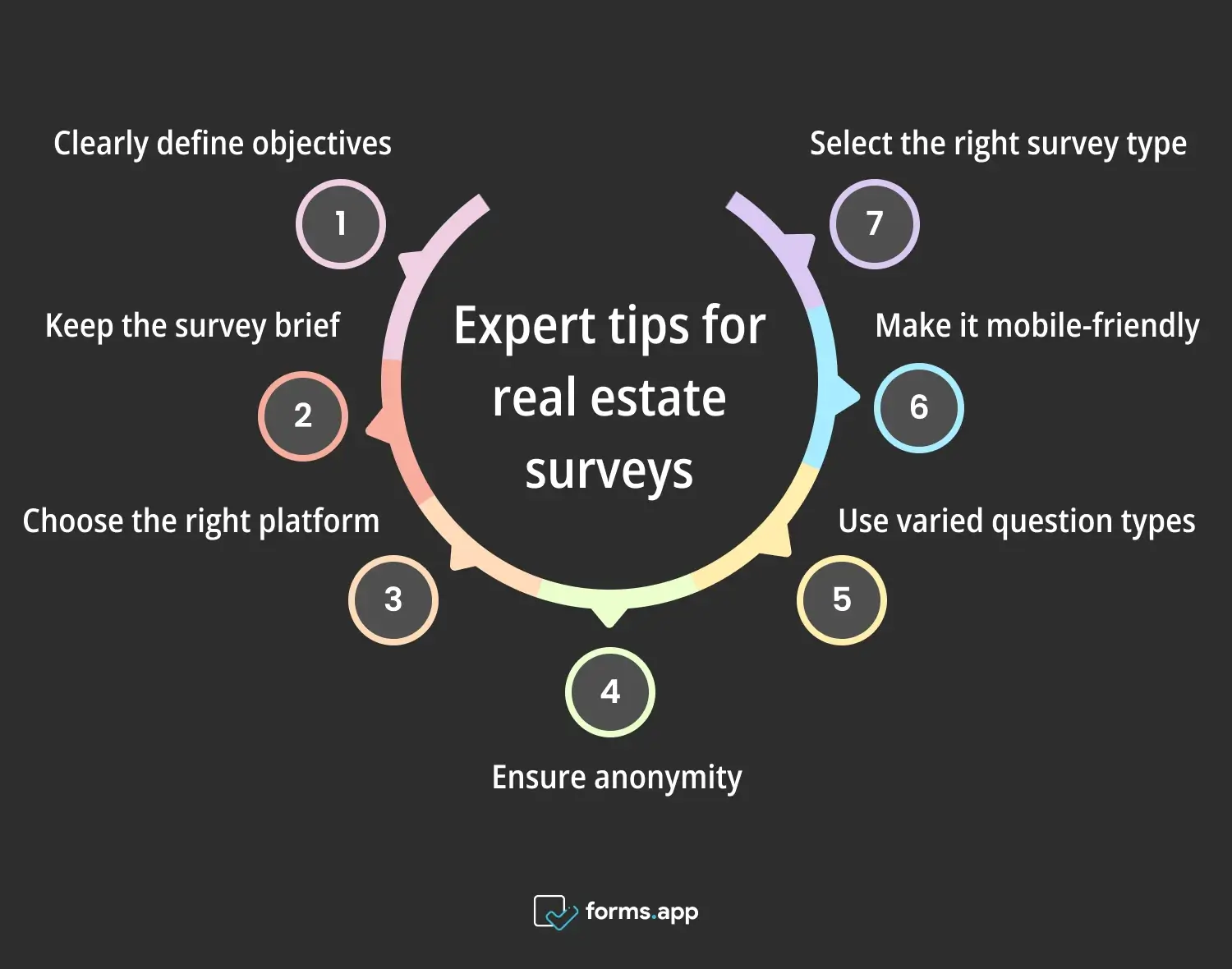
Pro tips for real estate surveys
💡 Clearly define your survey's objectives and goals.
💡 Ensure your survey is short to save participants' time.
💡 Choose the correct survey platform based on accessibility, real estate survey cost, and other factors.
💡 Reassure candidates about anonymity and confidentiality to increase participation.
💡 Structure your questions and use various question types.
💡 Make your survey mobile-friendly to enhance accessibility.
💡Consider the most appropriate type of real estate survey for you.
How to create a real estate survey without coding (with free templates)
You can easily create real estate surveys using the forms.app. You just learned about 15+ questions and why you need to ask them in your real estate survey. In this stage, you can learn how to create surveys by embedding these questions into your surveys. By following the 5 steps below, you can create your real estate survey, and you can better understand your buyers or sellers's opinions and expectations.
Step 1: Log in or sign up for forms.app
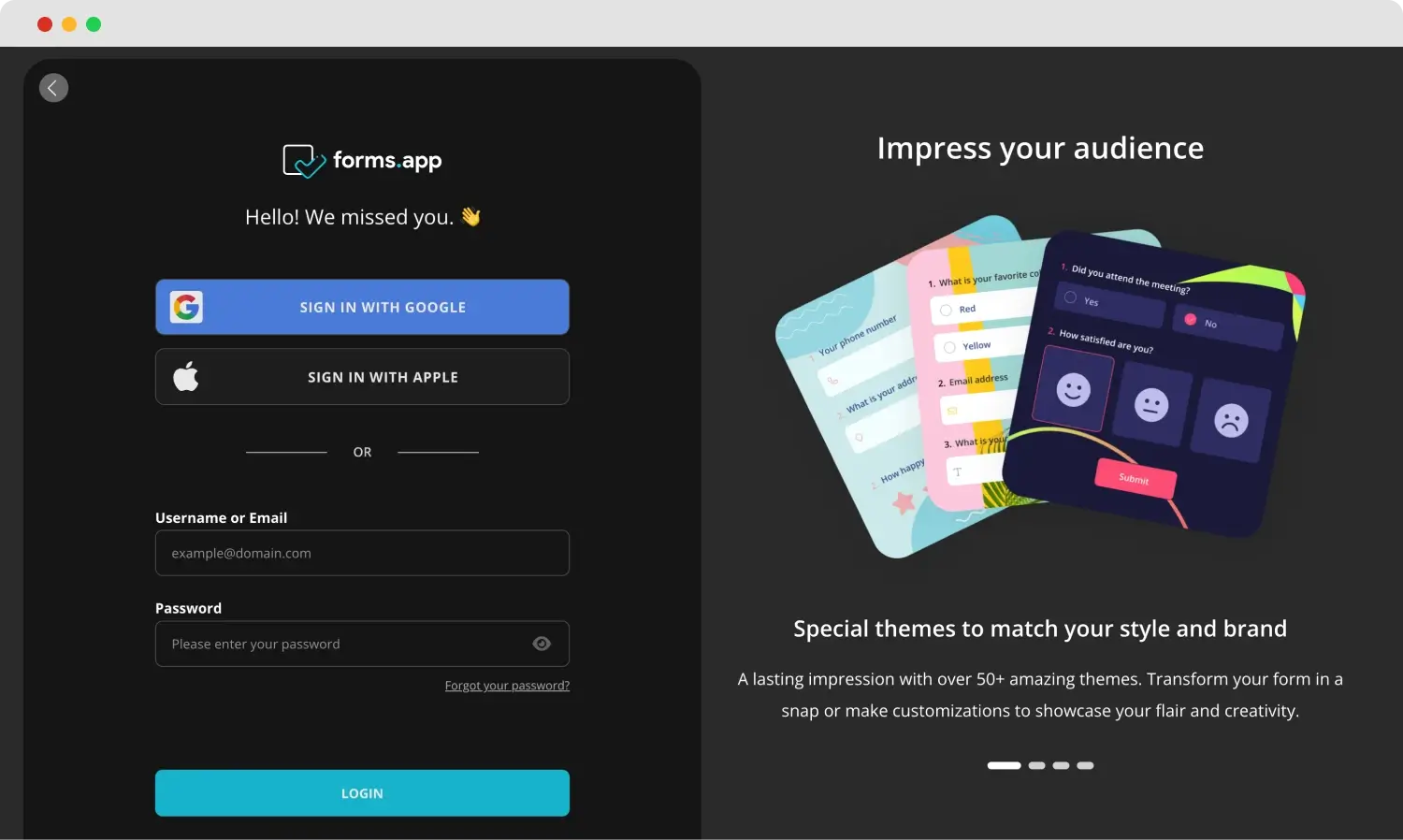
Login to your account
As a first step, you can start to create your real estate survey by signing up for an account using the forms app. You can create a free account in seconds if you don't have one. You can go directly to the platform if you already have an account. Apart from these, the forms.app allows you to log in using your Google, Apple, or Facebook accounts.
Step 2: Start from scratch, choose a template, or generate with AI
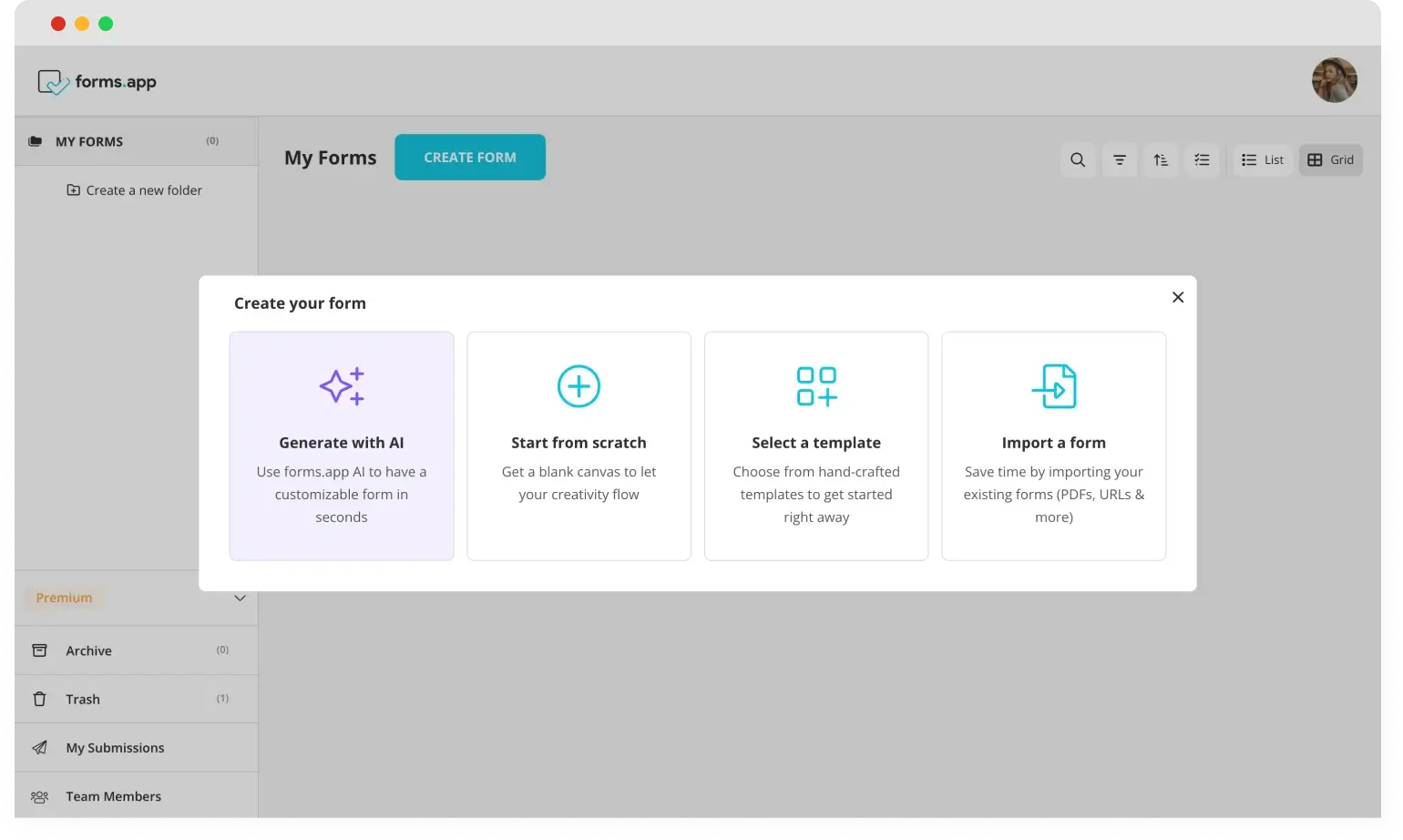
Choose a beginning option
Once logged in, click the Create Form button to create a new form. You can create your real estate survey, including your goals, for free. There are ready-made 7 real estate templates on forms.app. You can choose whatever you want according to your goals. Also, you can get help from forms.app AI for creating your survey.
Step 3: Add your questions
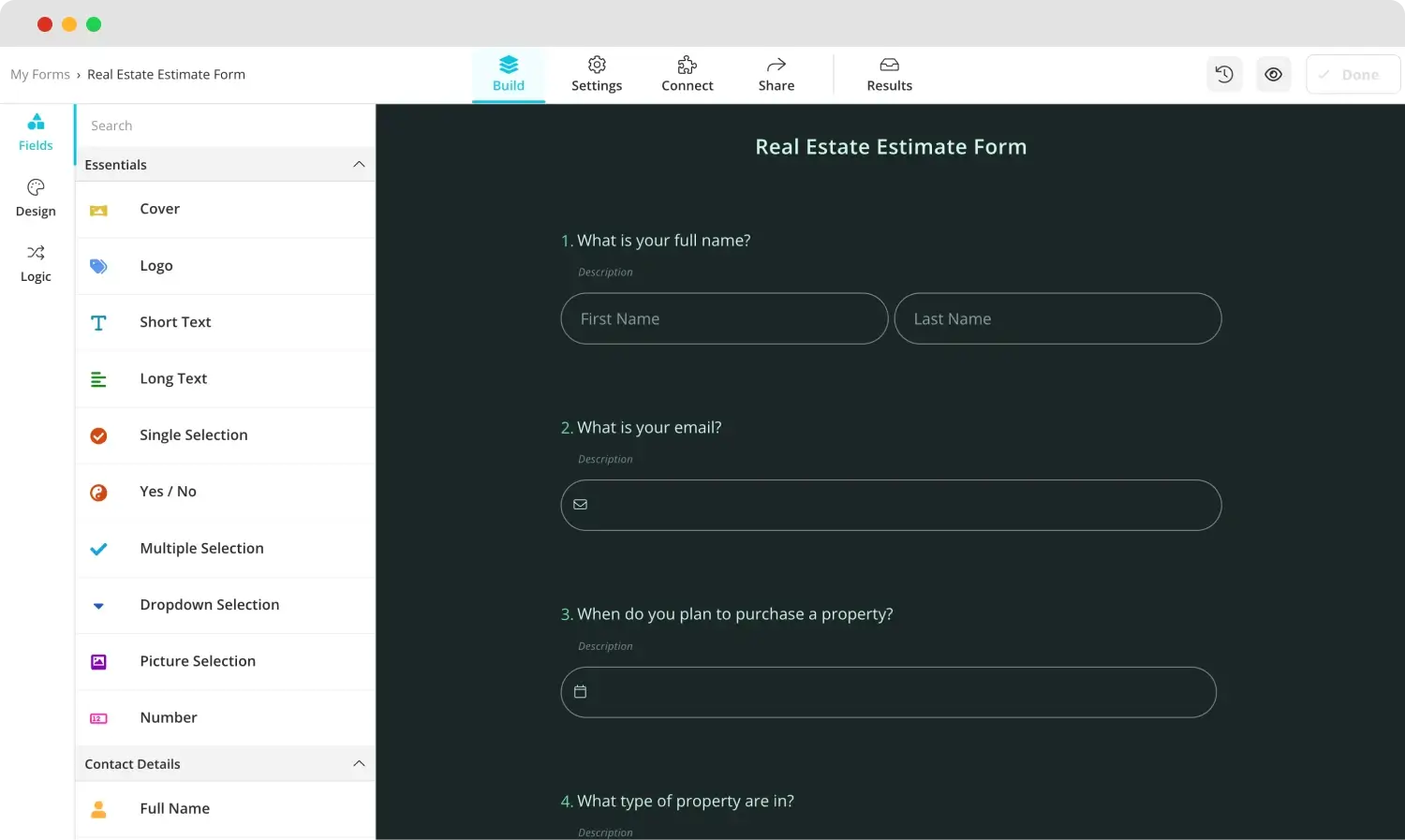
Add your questions
You can add your real estate survey questions once you choose a template that fits your goals. Based on your goals, you can use the 15+ real estate survey example questions above in your survey. The forms app offers a variety of question types, such as multiple-choice, short-answer, and long-answer. Combining question types helps you better understand your customers.
Step 4: Customize your form design
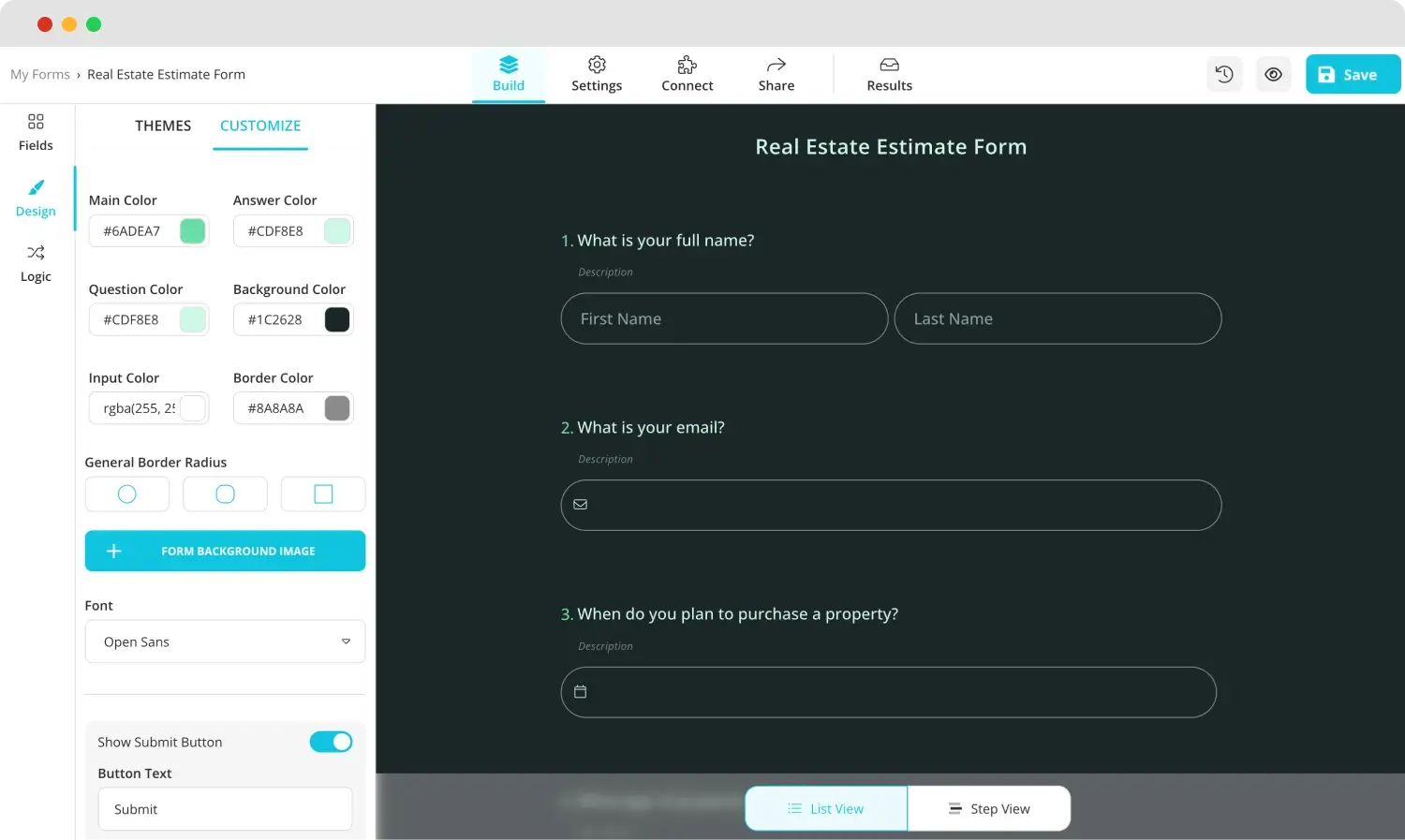
Customizing the design of your survey
forms.app offers rich content about your survey design. You can easily select a theme and change colors. You can also choose your form images, logo, and cover. Finally, you can tailor colors, fonts, and other overall design tools to create a survey that mirrors your organization’s identity organization.
Step 5: Share your survey and analyze the results
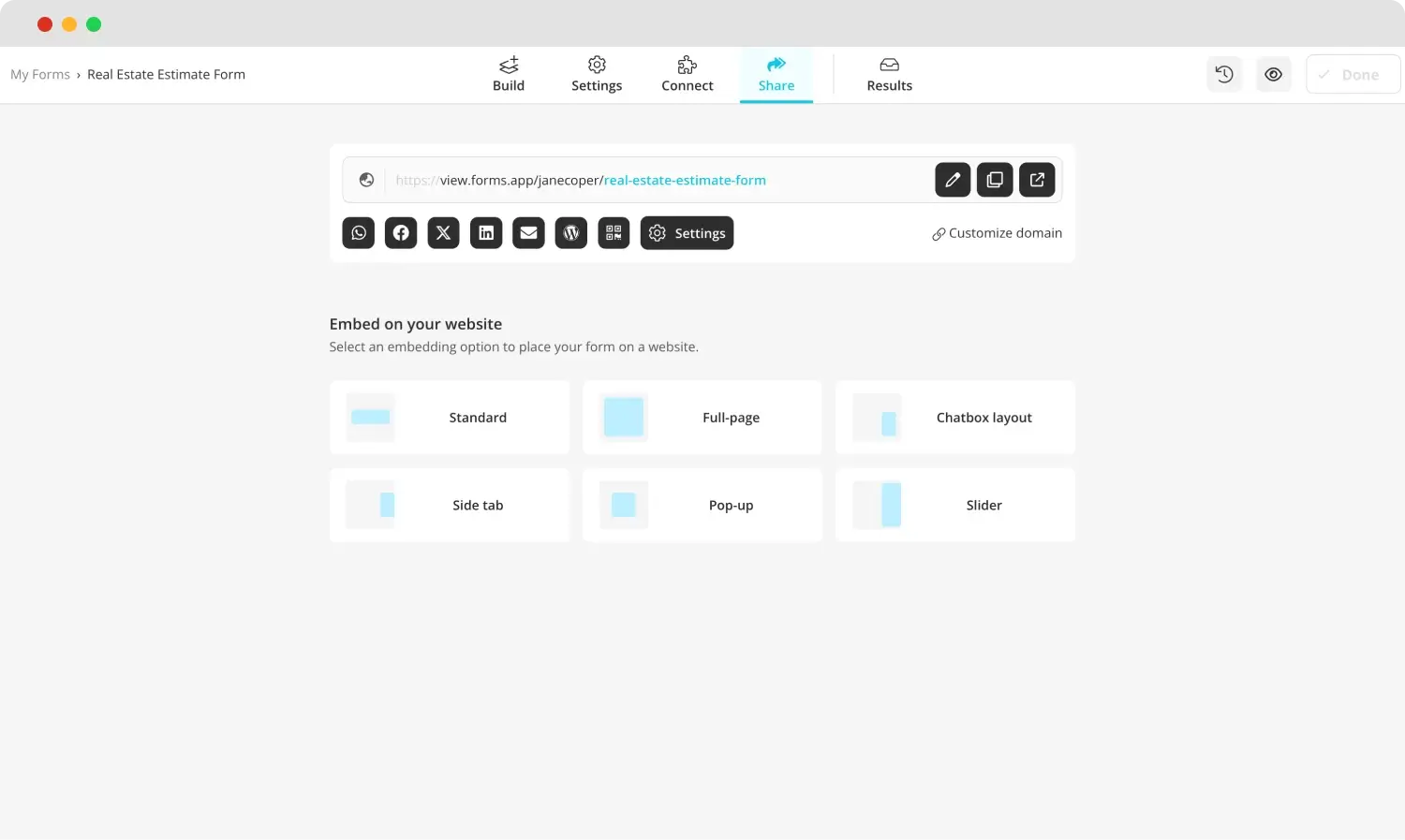
Share your survey
You can distribute your survey using the forms.app's various sharing options. You can share your survey on popular social media platforms like Facebook, Twitter, LinkedIn, and WhatsApp. You can also embed surveys on your website or share them using QR codes. Once you have gathered sufficient data, you can use the forms.app's features and filters to analyze results.
Key points to take away
Having a clear picture of the needs and expectations of your real estate buyers or sellers is key to developing a strategy to meet these expectations. Conducting a successful real estate survey allows you to guide your customers effectively and in a target-oriented manner throughout the real estate process. Therefore, you can take firm steps towards becoming a successful title company.
In this article, we first talked about what real estate surveys are about real estate research. Then, we included 15+ questions you can ask in these surveys and their reasons. You also learned how to create a real estate survey in 5 steps and tips for creating these surveys.
Işılay is a content writer on forms.app. She is passionate about advertising. This passion comes from the fact that she likes to make things interesting for people. She loves reading and writing. Işılay specializes in marketing, survey types, and program management.
